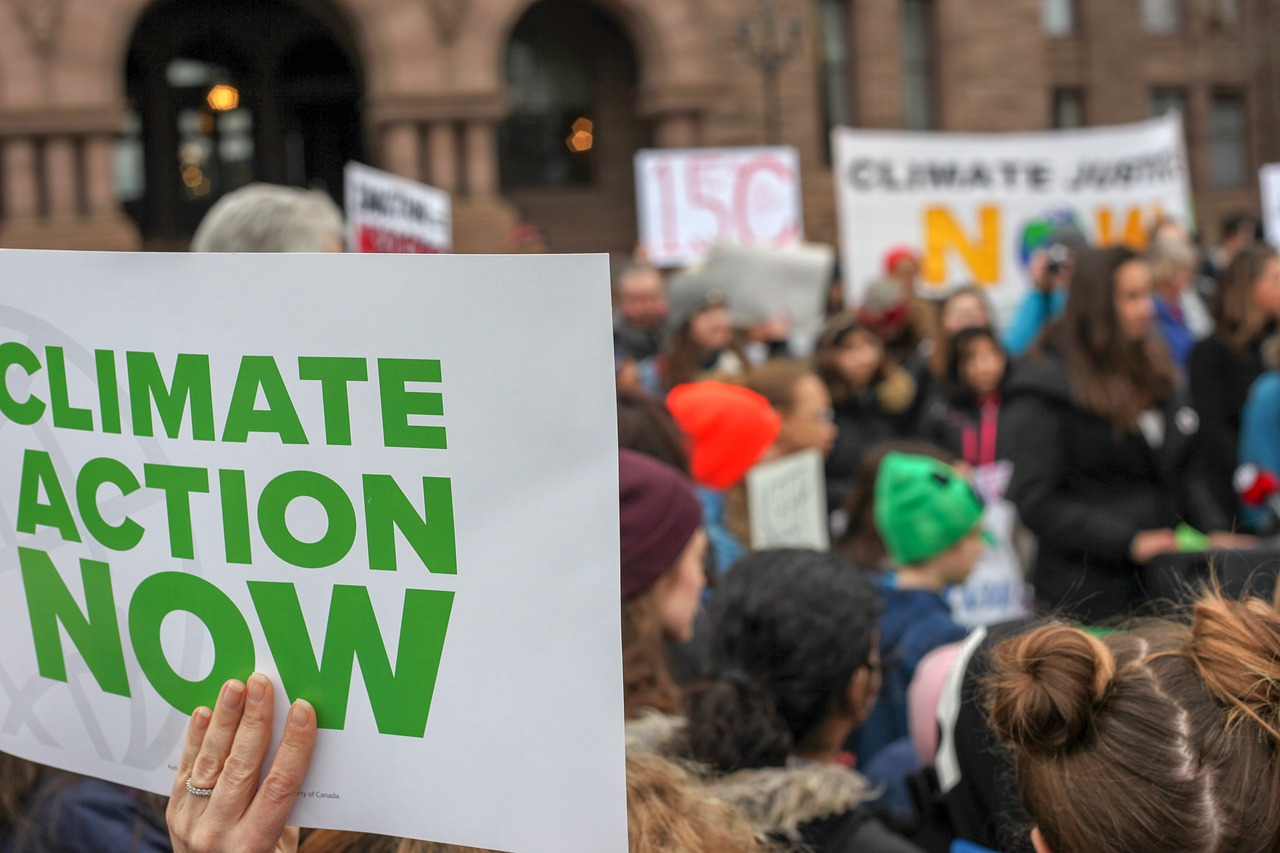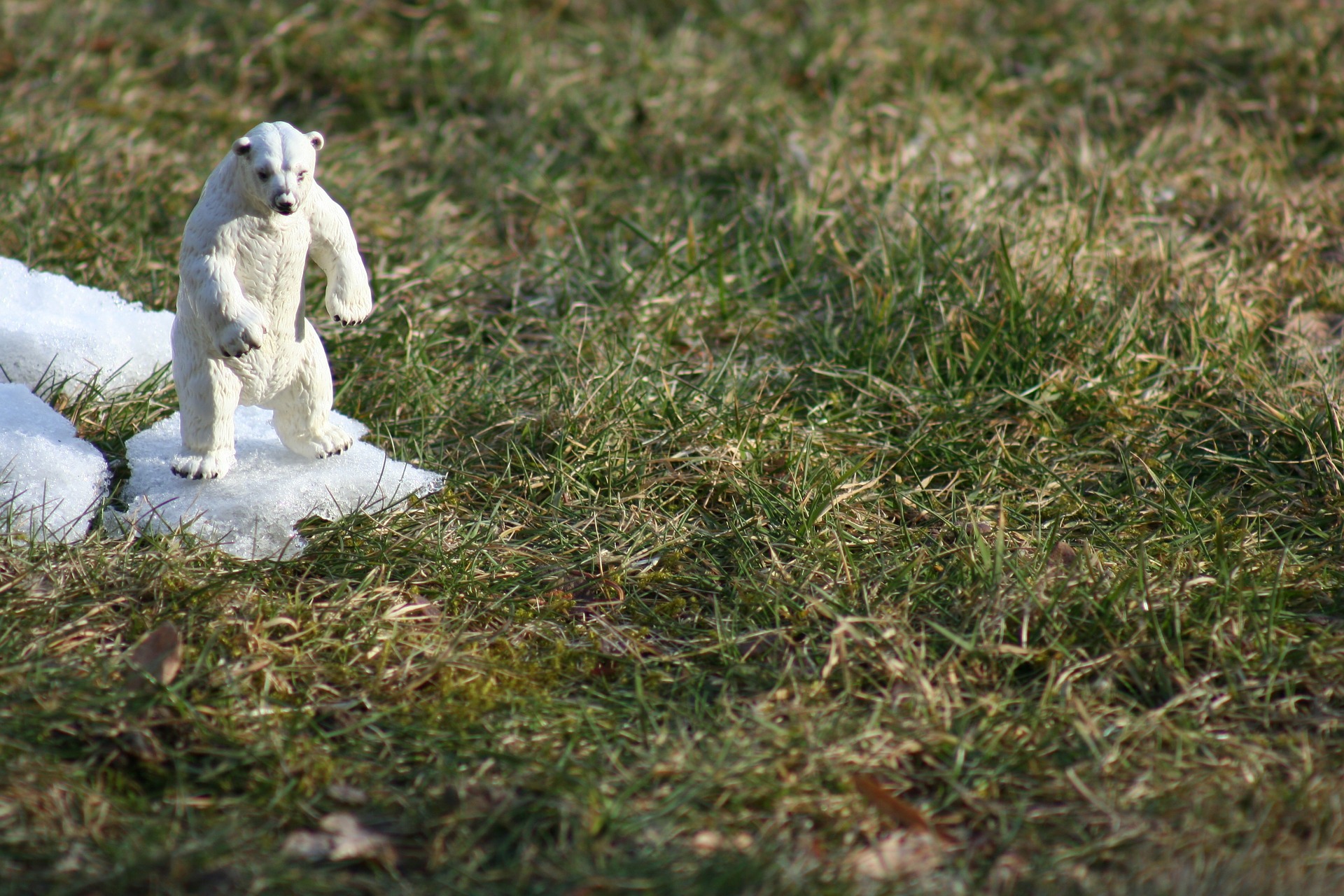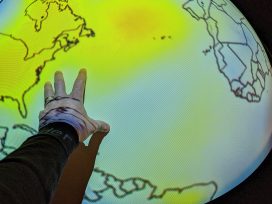The seven deadly sins of journalism
Climate change is the biggest story ever – and yet the media do not do it justice. To blame are a number of journalistic vices, from misinterpretation of the principle of neutrality to a failure to contextualize; from slavishness to conventional media formats to a tendency to individualize the problem. A new climate politics starts by resetting the media agenda.
A crisis is rarely singular. That’s the problem. The international community could very well have got global warming under control during the last thirty years. That was certainly how it looked at the 1988 World Conference on the Changing Atmosphere in Toronto. Unanimity prevailed – among scientists and politicians. Unanimity that the Earth’s climate was warming and that humans were the cause. And unanimity that action had to be taken as quickly as possible. The conference statement clearly ‘urges immediate action by governments’ in order to limit CO2 emissions. Since then, as we know, nothing of the sort has happened. CO2 emissions continue to increase throughout the world.
This history of political failure has been accompanied by a failure of the media. Politics has not responded to the climate crisis and neither have newspapers, radio stations or TV. Since Toronto, there has been a failure throughout the media to properly describe global warming, to explain the necessary measures, and to demand them from politicians. Climate crisis is one thing. But it could only grow to the extent it has because of a simultaneous crisis in communication, culminating in fake news and disinformation. We define a crisis in communication as the deterioration of public discourse. This process has multiple causes. An incomplete list would include the global deregulation of the media sector in the 1980s and 1990s; the triumph of commercial television and, in America, of conservative talk radio; the increasing pressure of viewer targets and circulation; media change and the crisis of the newspaper sector; and the emergence of disinformation, often but by no means always emanating from Russia. In order to understand the climate crisis, we urgently need to examine this crisis in communication.
However, there is also an inherent failure in the way the media has handled climate change that goes beyond structural changes. This failure is rooted in the ‘seven deadly sins of journalism’. They have contributed to a situation in which superior arguments and scientific facts are scarcely able to claim attention, let alone convince or exert political pressure.

Photo by Martin Reisch on Unsplash.
The seven deadly sins of journalism play a role in everything that is wrong with how climate change is covered. They culminate in journalism, when it does address climate crisis, losing itself in incoherent details. The energy question, for example, is not just about jobs, but about the political system in which we want to live in the future. In what follows, we argue that the climate crisis is linked to the crisis of democracy. Both climate and democracy are on the brink.
One thing is certain: anyone who continues to indulge in the seven deadly sins of journalism is accelerating a catastrophe that will damage society and nature like no other. The scientific evidence has been available for a long time, and the warnings are nothing new. No one will be able to say later that we couldn’t have known about global warming and the catastrophe it would cause. Indeed, to do so would be to commit the first deadly sin.
First sin: Continue having the wrong debates about climate change
There has always been more agreement among climate scientists than the media wanted to accept. Of course, the media’s job shouldn’t be to nod respectfully every time scientists claim to have discovered something. A critical, a sceptical press that interrogates assumptions and confronts the public with different points of view is the basis of our democracy. However, in the case of climate change, the media have gone way beyond the call of duty. Years after scientific consensus was reached about the link between the production of CO2 and global warming, many media continued to give the impression that it was still controversial, that uncertainties continued to abound over basic questions, and that precise knowledge about climate change was lacking.
This discrepancy between existing knowledge and what is reported has been powerfully documented by historian of science Naomi Oreskes. Searching for the phrase ‘global climate change’ in 928 articles published in specialist journals between 1993 and 2003, she found not a single one that disputed that global warming was caused by humans. But in newspapers and on TV during the same period, denials came up in every second item. The reason was partly because journalism considers it a duty to provide balanced coverage. But the result is a statistical absurdity. In Germany, for example, 97 percent of scientists are convinced of the role humans play in global warming. However, on the only occasion in 2017 that a German talk show discussed climate change, it featured a climate scientist and a climate change sceptic. If television wanted to achieve a true balance, it would need for every sceptic not just one scientist convinced of anthropogenic climate change but 32 or 33 of them. Either that or it would have to broadcast dozens more talk shows that didn’t include climate change sceptics.
There is also another, probably more serious reason for the massive over-representation of marginal scientific positions. This has to do with how media function. It is a truism of news journalism that impact is more important than the underlying set of circumstances; that the individual is more exciting than the group, that conflict is more interesting than consensus; and that a fact is worth reporting not just because it explains something, but also because it adds something to a story or fuels a debate. No wonder the media picked up and ran with far-fetched explanations for climate change with such eagerness, regardless of how ridiculous they were. The debate has therefore gone round in circles ad nauseam.
It is only in the last two or three years that some major media outlets have started to fulfil their basic duty to provide information. In 2018, the BBC released internal guidelines on reporting about climate change after it admitted to getting ‘coverage of it wrong too often’. The guidelines warn against creating a false balance: ‘To achieve impartiality, you do not need to include outright deniers of climate change in BBC coverage, in the same way you would not have someone denying that Manchester United won 2–0 last Saturday. The referee has spoken.’
Partly as a result, climate change denial now thrives in the darker corners of social networks or on Russian propaganda channels. But this is no reason for complacency. Journalism still commits the deadly sin of holding the wrong debate, just in a different form. It is no longer a question of whether climate change exists and if so, whether humans are responsible for it, but about things like whether electric cars contribute to decarbonization, or whether they too are climate killers. There is also scientific consensus on these questions, but again the media does not recognize it. The preference is still for controversy, frequently combined with lack of interest in a consensus that threatens the fossil business model. To repeat: scientists are convinced that electromobility can make a major contribution to limiting global warming, provided of course that the electricity used to produce such vehicles comes from renewable sources, and that renewable energy is also used to charge their batteries. This is why all serious scientific climate protection strategies include the development of electromobility alongside energy transition. The positive effect of the electric car is cancelled out when – surprise – electricity derived from coal and oil is used to produce and run the car. Sceptics’ repeated use of this non-argument against electric cars, complete with reference to studies, gives the impression that electromobility is dubious and scientifically controversial.
Second sin: Leaving climate change to the natural sciences
The second sin of journalism is simply to leave the topic of climate change to the natural sciences. Reports on increasingly precise scientific predictions are numerous. Calculations as to how high and how quickly temperatures and sea levels will rise are publicized regularly. The whole thing culminates in the circus around the UN climate conferences, where climate scientists make earnest appeals and where politicians’ presence alone conveys the impression that they are taking the matter seriously. As the sociologist Michael Brüggemann has shown, this is the case even when climate scientists consider the event to have been a catastrophic failure – in other words, on every occasion apart from Paris in 2015.
Let’s be clear: it is important to report on scientific findings. In the language of philosophical logic: reporting on climate science is a necessary condition for a sensible climate discourse. However, it is not a sufficient condition. Because, in addition to the scientific aspects of the climate crisis, journalism also needs to spell out other implications, be they social, cultural, geostrategic, economic, historical, psychological or, as here, media theoretical. So far, none of these have received much attention. Because global warming has until now been treated as entirely a question of science, there are still only a few journalists from other areas with the confidence to pick up this hot potato. The same ingredients end up being recycled again and again, with the result that climate journalism seems increasingly vapid.
Climate change is not the preserve of specialists. Rather, it is a ‘total social fact’ (Marcel Mauss). There is so much to be written, filmed or said about the climate crisis! What is its intellectual history? What are the origins of ‘hydrocarbon man’ (Daniel Yergin)? What does the climate crisis mean for literature and art? What forms of education do we now need? And what conventional forms of education now need to be abandoned? What about the increasingly nervous oil exporters? Russia, for example, is set to lose a large chunk of its foreign income as a result of the energy transition. Will the West have to bail Russia out? If so, how? What are the implications for the Middle East if no more CO2 is emitted from 2050 onwards, because otherwise the Paris climate targets cannot be achieved? What is the real cost of the energy transition in comparison to the cost of fossil fuels, which receive far higher subsidies than renewables worldwide and whose environmental impact would also have to be included in the equation?
Seldom does one come across such questions in the mainstream news. The climate crisis is the greatest challenge that humanity has ever faced, and yet in the media it is a mere sideshow left to a handful of specialist journalists, most of whom have natural sciences backgrounds.
Third sin: Treating climate change as a green issue
As a ‘total social fact’, climate change cannot be forced into a party-political corset. Yet journalists repeatedly fall into the trap of treating climate change as a Green issue. It is rather like seeing democratic politics is a leftwing thing, because in the 19th century democracy was fought for primarily by leftwing politicians, while on the conservative side monarchical ideas still dominated. However, the fact is that many prominent climate politicians are not on the left, the US Republican George Shultz being just one example.
Essentially, all parties can find philosophical points of reference for an ambitious climate policy, be it the preservation of God’s creation (conservatives), freedom in responsibility (liberals), the rational organization of the metabolism between society and nature (socialists), or the idea that we have only borrowed the Earth from our children (Greens). No doubt he far-right will also take the opportunity to discover renewable energy. After all, it is difficult to explain to nationalists why the country’s system runs on foreign energy, be it ‘terrorist oil’ from the Middle East or the oil of Russian oligarchs.
For liberals, climate policy is even closer to home. What could be more liberal than taking action against rising temperatures freely, before being compelled to do so by the onset of catastrophe? How can liberals’ defence of fossil fuels be reconciled with the fact that these are highly subsidized worldwide, despite wind and solar sources alreday producing cheaper energy in many locations? Shouldn’t free market principles long since have driven liberals into the arms of renewables, which stand today for innovation?

Photo by filmbetracherin from Pixabay.
Commitment to combating climate change clearly doesn’t fit into the categories of Right and Left. Global warming threatens all life on our planet. The energy transition is an opportunity for all parties, be their programme modernist, nationalist, welfare-statist, anti-capitalist or conservative. The media’s great mistake is not to see these connections.
Or rather: to have lost sight of them. When climate catastrophe first emerged as an imminent threat in the 1980s, there was an international consensus both in politics and the media that action needed to be taken fast. The Intergovernmental Panel on Climate Change was established with the support of the Reagan administration – today, the UN body is enemy number one for many Republicans. The fossil fuel elites have a long history of politicizing and polarising questions of climate change, particularly during the 1990s and 2000s. Their propaganda efforts are well known; the point to make here is that the media have played their part to the best of their ability. The logic of proportional representation continues to determine coverage of climate change, when instead the media should be exposing instances where parties miss the big issue, or their own issues with confronting it. When climate policy is treated solely as green issue, it follows that there cannot be too much coverage of the matter, because otherwise one would constantly be talking up the Greens. The consequences are fatal.
Fourth sin: Thinking that decarbonization equals loss
In the media, climate policy is not only Green – it is also means kicking fond habits and doing without with material comforts. Decarbonisation will cost us dear, we are repeatedly told. It is not climate change and the livelihoods that it will rob us of that frightens us, but everything that we will lose if we try to stop it.
This distortion of the facts frequently accompanies a tendency to individualize the problem. Not only will individuals bear the burden of climate policy – they will be obliged to drive less, eat less meat, fly less, and pay more for everything because of rocketing energy prices – they will also be at the forefront of the fight against climate change. It is as if the privatization discourse of the 1980s and 1990s, which said that each individual was responsible for their own fate and that society did not exist, has been projected onto the climate issue, which can only be resolved if every individual does their bit. One reads countless reports, commentaries and personal accounts about the lengths to which individuals can go in order to reduce CO2 emissions in everyday life just that little bit more. Such efforts are then celebrated as outstanding engagement in combatting climate change.
However, any journalist who either holds individuals liable or frames climate policy in terms of loss is either in the pay of the fossil fuel industry or unknowingly acting as its useful idiot. The perspective must be reversed: it is not the individual who can do something, but politics and the collective. Structures and conditions need to be created within which emitting as little CO2 as possible is both the obvious and the worthwhile thing to do. A low-carbon lifestyle could easily be promoted through carbon taxes and by diverting subsidies away from fossil fuels towards renewables. This has not just been the case since recent advances in wind and solar power and new storage technologies. Back in 1995, the Club of Rome’s Factor Four report argued that prosperity could be doubled using just half the amount of natural resources currently being exploited.
Ever since, the media could have reported that climate policy and energy transition meant overall economic gain, and that every euro invested in decarbonisation would be returned several times over. The calculations were already done in 2006 by Nicholas Stern, the former chief economist of the World Bank, and have since repeatedly been proven correct. We will only incur losses as societies and individuals if we do not implement energy transition. The result would be less prosperity, fewer jobs, fewer livelihoods, less biodiversity, poorer health, more unequal distribution of wealth, and less political participation, which under the regime of the fossil industry and the stress of climate adaptation will be reduced, as governments become more authoritarian and oligarchic.
Fifth sin: Generalizing responsibility for climate change
The counterpart to the individualization imperative – you must change your life! – is the kind of generalization that says that everyone is to blame and that everyone must do something. The human being – note the collective singular – is a Promethean creature. Likes playing with fire, always has done. That’s why the planet is heating up.
This generalization is fatal. It amounts to a theory of collective guilt by obscuring responsibility and alternative courses of action. It causes us to lose sight of who exactly fuels climate change, who profits from it, and who dilutes and delays environmental policies. And it also conceals those who, on the other side, are demanding climate action and developing the necessary measures and strategies. Finally, it loses sight of the centre of society: why it looks away and remains apathetic, effectively supporting those whose fossil-fuel interests are driving climate change forward.
Political scientists Patrizia Nanz and Manuel Rivera analyse this problem in a paper on ‘narratives of sustainable development’.1 They conclude that the climate and sustainability discourse ‘structurally avoids naming political antagonists and tends towards incomplete constellations of actants’, which is to say that the discourse avoids stating all those involved. However, generalization not only obstructs political action. Nanz and Rivera identify another failure: ‘The result is bad storytelling, a palpable lack of narrativity.’ In other words: generalizations about climate change are boring. Although hardly anyone pays attention to it, this type of journalism is still a mortal sin. Because it is people who make history. Special emphasis therefore needs to be put on people active in climate change (which includes us all – here generalization is apt because not doing anything is also doing something) and their various motivations.
The blame for climate change lies largely with the large oil corporations, firms like Exxon, which knew about the dangers of global warming back in the 1980s. When, at the end of the decade, the global community indicated its determination to combat climate change, the oil industry embarked on a huge disinformation and lobbying campaign in order to protect its businesses model. Also largely to blame are politicians – in the United States, mostly Republicans; in Europe, many of the mainstream parties, including leftwing and liberal parties – who, because of their closeness to fossil fuel industries or to oil-exporting nations such as Russia, have blocked or delayed new energy policies for thirty years. A degree of responsibility for climate change must also be borne by the journalists guilty of using generalization to evade the issue. They are particularly to be found writing for conservative papers; however, in the past thirty years, liberal-left titles have also all too frequently failed to give climate change front-page coverage.
Sixth sin: Failing to see the bigger picture
The media treat climate change as one topic among many. In structural terms, a report about a hurricane is not much different to one about a football match. The outcome is given (win, draw, defeat / number of casualties, cost of damage), the events reconstructed (the course of the game / storm), and an assessment offered (did the storm have anything to do with climate change or was it just a normal weather phenomenon / did Real Madrid deserve to win or not?). In sports news, individual results are ordered on a table. This is crucial in order to hold viewers’ attention. With climate journalism, there is no table. Instead, we are left with an incoherent heap of fragments. The bigger picture is more blurred, incomplete and incomprehensible than with almost any other topic in the media.
This lies in the nature of the thing itself. Climate change is a ‘hyperobject’ (Timothy Morton): a massive phenomenon extending throughout space and time. Conventional journalism is hopelessly out of its depth. The constant flow of news – here a climate conference, there a forecast about rising sea levels, here a squabble in the coal industry – leaves the public feeling weary and overloaded. Argh, climate change. No one really knows what’s going on!

Photo by atsilis from Pixabay.
Rolling news was always problematic. But when it comes to climate change it really comes up against its limits. Generally, we need a journalism that is more relational; specifically, we need a curated journalism that can deal with specifics. A relational approach acknowledges that climate change affects almost all areas of social and political life. This would mean that the media establish connections between different fields of knowledge and show relevant connections to individual and social life. The very term ‘climate journalism’ would become superfluous; as superfluous as the term ‘democracy journalism’. The climate change issue needs to be able to flow naturally into news about migration, far-right populism, pension levels, the health system, literature, and so on.
‘Curatorial journalism’ is what communications specialist Seth Abramson proposes for major complex topics. This kind of journalism distils connections from individual reports that are produced over a long period of time, and which are now available in unprecedented numbers. The aim is to establish a comprehensive and reliable narrative based on trustworthy sources, one that can explain, in an accessible way, how we got to where we are. ‘Done well, the result of all this compiling, connecting and synthesizing will be not just a thorough history but also the production of new knowledge’, Abramson argues.
If rising temperatures and sea levels are reported upon in connection with migration, the rise of rightwing populism, climate change denial, the massive influence of fossil fuel industries and energy exporting nations on social discourse and on the policies of western democracies, and the aggressive geopolitics of many oil-dependent states – then it becomes clear that this is about much more than whether we go to work in electric cars. Climate change is and has always been about the future of democracy.
Seventh sin: Underselling climate change
Climate change rarely makes the front pages or prime-time slots. Rarely is the issue tackle in lead articles either. As a journalist, there’s no great incentive to cover climate change. One is still recognized professionally without ever having written a word about it. In terms of scale and impact, climate change is the biggest story ever– but in contrast to terrorism, Islam or far-right populism, it has never become a dominant topic in journalism. The situation is often justified with reference to viewer and reader figures: climate change is a marginal topic because the public is only marginally interested in it. This is a lazy argument, because it underestimates the power of agenda-setting.
Neil Postman argued that media assert a ‘specific definition of reality’. He quotes Niklas Luhmann in The Reality of the Mass Media: ‘What we know about our society, indeed about the world in which we live, we know from mass media.’ The media does not dictate what people say and think. But it certainly does determine what they think and talk about. If climate change hadn’t been sidelined, there would be readers and viewers for it. Public interest could have been generated at any time.
If the media avoid the seven deadly sins; if they give more prominence to everything to do with climate change and do so more often; if they have the right debates; if they report on the topic’s many different social and geopolitical facets and do so from different perspectives; if what they publish prompts political parties to compete to develop the best climate policies; if they point out the opportunities that come with the energy transition; if they name the villains, the heroes and the useful idiots; if they piece together a compelling narrative that explains what is happening here and now – then the public will flock to them. And not only that. Society will demand a new politics that acts decisively.
In: Brigitte Bertelmann, Klaus Heidel (eds.), Leben im Anthropozän: Christliche Perspektiven für eine Kultur der Nachhaltigkeit (Life in the Anthropocene: Christian outlooks for a culture of sustainability), Munich: oekom verlag 2018, 137–148.
Published 18 June 2019
Original in German
Translated by
Ben Tendler
First published by Wespennest 176 (2019)
Contributed by Wespennest © Maximilian Probst / Daniel Pelletier / Wespennest / Eurozine
PDF/PRINTPublished in
In collaboration with
In focal points
Newsletter
Subscribe to know what’s worth thinking about.
Related Articles

The feeling that we are being watched by a wild animal can lead to shock. Suddenly we comprehend how immense the world is, and how overwhelmingly lonely we feel.

Although it makes for a great dramatic effect, the theories of the sudden death of democracy disregard the gradual erosion and capture of institutions, and the role of the populace – argues political scientist John Keane.






